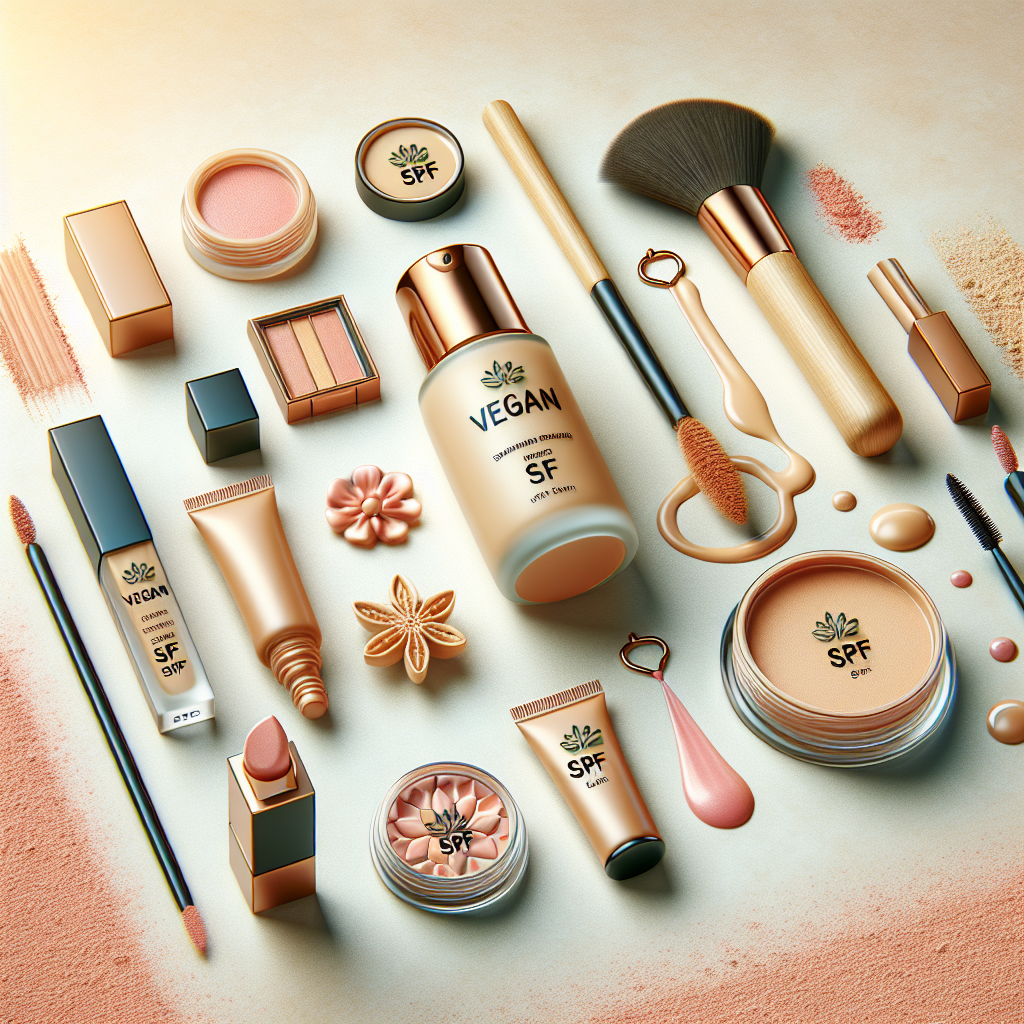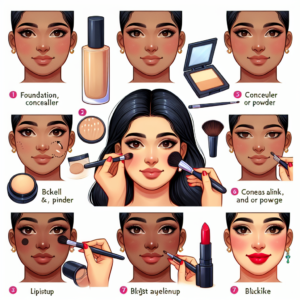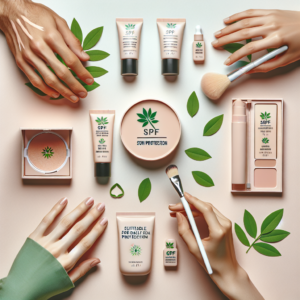
Key Takeaways: Article-at-a-Glance
-
Understanding the unique benefits of SPF vegan makeup for those with sensitive skin.
-
Identifying what makes makeup both vegan and suitable for sensitive skin protection.
-
Learning about the essential ingredients that nurture sensitive skin without causing irritation.
-
Discovering how to choose the right products and shades for a natural, healthy look.
-
Gaining practical tips for daily application to maintain skin health and maximize protection.
Discovering SPF Vegan Makeup for Sensitive Skin
When it comes to caring for sensitive skin, the makeup you choose plays a pivotal role. Imagine stepping out into the sun, feeling confident that your skin is not only looking its best but is also shielded from harmful UV rays. This is the peace of mind that SPF vegan makeup offers. It’s a blend of purity, protection, and kindness—kindness to your skin and to our animal friends.
Defining SPF Vegan Makeup
So, what exactly is SPF vegan makeup? It’s a product that contains no animal-derived ingredients and is not tested on animals. But it doesn’t stop there. It also includes sun protection factor (SPF) to guard your skin against the sun’s damaging rays. This combination is a game-changer for those with sensitive skin, providing coverage and care without compromise.
-
No animal by-products or testing involved.
-
Contains SPF to protect from UVA and UVB rays.
-
Formulated without common irritants, perfect for sensitive skin.
-
Often enriched with natural, soothing ingredients.
-
Contributes to a cruelty-free beauty routine.
Choosing SPF vegan makeup means you’re not just making a beauty choice; you’re making a lifestyle choice that reflects your values and your concern for your skin’s health.
Why Sensitive Skin Needs Special Care
Sensitive skin is like a delicate flower under the strong sun—it needs extra care. It’s more prone to reactions like redness, itching, and dryness. This is why the makeup you use should not only beautify but also protect and nurture your skin.
-
More likely to react to harsh chemicals and allergens.
-
Can develop irritation from exposure to the sun and environmental pollutants.
-
Requires hypoallergenic and non-comedogenic products.
-
Benefits from anti-inflammatory and soothing ingredients.
-
Needs products that reinforce the skin’s natural barrier.
With the right SPF vegan makeup, you can create a barrier against external factors that aggravate your skin, all while keeping your ethics in check.

Evaluating Ingredients in SPF Vegan Makeup
Ingredients are the heart of any makeup product. For those with sensitive skin, it’s not just about avoiding animal-derived ingredients; it’s about ensuring that what you’re putting on your face won’t cause an adverse reaction. Let’s break down the ingredient list to understand what should be in your makeup bag.
Start by looking for products labeled as ‘non-comedogenic’ and ‘hypoallergenic’. These are less likely to clog pores or cause allergic reactions. But also, get familiar with the ingredients themselves. You want to see things like zinc oxide or titanium dioxide for sun protection—these are minerals that are gentle on the skin.
-
Zinc oxide and titanium dioxide for gentle sun protection.
-
Natural oils like coconut or argan oil for hydration.
-
Antioxidants such as vitamin E to combat free radicals.
-
Plant extracts like aloe vera or chamomile to soothe the skin.
-
Mineral pigments for natural color without synthetic dyes.
By understanding what goes into SPF vegan makeup, you’re taking control of your skin’s health and ensuring that every layer you apply is adding to your skin’s well-being.
Ingredients to Embrace for Sensitive Skin
Your skin deserves the gentlest ingredients, ones that love it back. Look for makeup that’s packed with natural, nourishing components. Aloe vera, for instance, is a superhero for sensitive skin, offering soothing hydration. Shea butter is another ally, providing moisture without clogging pores. Green tea extract brings its anti-inflammatory powers to the mix, calming redness and irritation.
-
Aloe vera for soothing and hydration.
-
Shea butter for non-comedogenic moisture.
-
Green tea extract to reduce inflammation.
-
Niacinamide to strengthen the skin barrier.
-
Mineral-based pigments for safe coloration.
-
Jojoba oil to balance skin’s natural oils.
-
Calendula extract, known for its healing properties.
These ingredients are your friends, chosen for their gentle touch and beneficial properties that cater to the needs of sensitive skin.
Ingredients to Avoid to Prevent Irritation
Just as there are ingredients that embrace your skin, there are those you should avoid to prevent irritation. Synthetic fragrances and parabens are notorious for causing reactions. Alcohol can dry out and irritate sensitive skin, while sulfates strip away natural oils. Chemical sunscreens may also be a no-go; instead, opt for mineral-based ones that are less likely to cause a reaction.
-
Synthetic fragrances that can trigger allergies.
-
Parabens, which can disrupt skin’s balance.
-
Alcohols that overly dry the skin.
-
Sulfates that can strip away natural oils.
-
Chemical sunscreens that may cause sensitivity.
-
Phthalates, often linked to skin irritation.
-
Artificial dyes that can lead to reactions.
Being mindful of these ingredients can help you maintain happy, healthy skin, free from unnecessary stress.
Finding Your Vegan SPF Makeup Match
Finding the perfect vegan SPF makeup is like finding a soulmate for your skin. It should complement your natural tone, feel comfortable, and most importantly, protect and care for your skin. Start with samples when possible, to test how the product feels and reacts with your skin. And remember, the best match will tick all the boxes: vegan, SPF, and suitable for sensitive skin.
Navigating Shade Selection for a Natural Look
Shade selection can be tricky, but the goal is a seamless blend with your natural skin tone. If you’re between shades, it’s often best to go with the lighter option, as you can always build up coverage or add bronzer for depth. Some brands offer online quizzes or virtual try-ons, which can be a great starting point. But nothing beats testing the product in natural light for the truest match.
-
Opt for the lighter shade if in doubt.
-
Use online tools for initial guidance.
-
Test products in natural lighting for accuracy.
-
Consider your skin’s undertones for the best match.
-
Look for brands with extensive shade ranges.
With these tips, you’ll be well on your way to picking a shade that looks like a second skin.
Testing Products for Skin Compatibility
Before you commit to a full-size product, do a patch test. Apply a small amount of the makeup to your inner forearm or behind the ear and wait 24 hours. If there’s no sign of irritation, you’re good to go. This simple test can save you from potential discomfort and is an essential step in finding your vegan SPF makeup match.
-
Always conduct a patch test before full use.
-
Wait 24 hours to ensure no irritation occurs.
-
Test in areas with thin skin for sensitivity.
-
Keep a diary of ingredients that work well for you.
-
Don’t be afraid to mix and match brands.
Remember, your skin’s compatibility with a product is key to a happy, healthy complexion.

Everyday Application Tips for Sensitive Skin
Applying makeup should feel like a treat, not a challenge. For those with sensitive skin, it’s all about the technique. Gentle application not only prevents irritation but can also improve the overall health of your skin. The key is to use a light touch and tools that are kind to your skin, such as soft brushes or a clean sponge.
Techniques for Gentle Application
Start with a clean canvas by washing your hands and face. Then, apply a moisturizer suited for sensitive skin to create a smooth base. When it’s time for makeup, dab and blend, don’t rub. Use brushes with soft bristles and tap the product onto your skin. If you’re using a sponge, make sure it’s damp to avoid dragging the skin.
-
Wash hands and face before application.
-
Use a moisturizer as a base.
-
Dab on makeup gently, avoid rubbing.
-
Opt for tools with a soft touch like sponges or brushes.
-
Apply in layers for buildable coverage.
By following these techniques, you’ll ensure that your makeup enhances your skin without causing distress.
Maintaining Skin Health with Daily Makeup Use
It’s not just about how you apply makeup; it’s also about what you do after. Always remove your makeup at the end of the day with a gentle cleanser. Follow up with a soothing toner and moisturizer to replenish your skin. And don’t forget to regularly clean your makeup tools to keep bacteria at bay.
-
Remove makeup daily with a gentle cleanser.
-
Follow up with a toner and moisturizer.
-
Regularly clean your makeup brushes and sponges.
-
Allow your skin to breathe by having makeup-free days.
-
Stay hydrated and maintain a balanced diet for skin health.
These habits will help you maintain a radiant complexion, free from the stress of daily makeup wear.
Top-Rated SPF Vegan Makeup Brands for Sensitive Skin
With so many brands on the market, it can be overwhelming to find the right one for your sensitive skin. But don’t worry, we’ve done the legwork for you. The following brands have been highly rated for their commitment to vegan formulas, sun protection, and gentle ingredients suitable for sensitive skin types.
Favorites for Flawless Coverage
For those seeking a foundation that offers full coverage without the weight, look no further than Brand A. Their SPF-infused formula is a favorite among those with sensitive skin for its breathable and hydrating properties. Brand B’s mineral powder is another go-to for a lightweight feel and natural finish, providing SPF protection with a matte look.
-
Brand A: Known for hydrating, full-coverage foundations with SPF.
-
Brand B: Offers mineral powders for a natural, matte finish with sun protection.
-
Brand C: Celebrated for their concealer range that camouflages and cares for the skin.
-
Brand D: Provides a selection of tinted moisturizers perfect for a subtle, everyday look.
-
Brand E: Their BB creams are a hit for those who love a multitasking product with SPF.
Each of these brands brings something unique to the table, ensuring that you don’t have to compromise on coverage, comfort, or care.
Highlighting Sun Protection and Skin Benefits
When it comes to sensitive skin, sun protection is non-negotiable. SPF in makeup acts as a daily shield, blocking out the harmful effects of the sun that can lead to premature aging and exacerbate sensitivity. But it’s not just about protection; it’s also about the skin benefits that come with SPF vegan makeup. These products are often enriched with antioxidants and nourishing ingredients that support skin health, offering a dual advantage.
-
SPF helps prevent sunburn and skin damage.
-
Antioxidants in vegan makeup fight against environmental stressors.
-
Nourishing ingredients like vitamins and minerals improve skin texture.
-
Regular use of SPF makeup can reduce the risk of skin cancer.
-
Anti-inflammatory properties help soothe and calm sensitive skin.
By choosing makeup with SPF, you’re not just covering up; you’re caring for your skin’s future.
The Daily Ritual: Incorporating SPF into Your Makeup Routine
Make SPF a non-negotiable part of your daily makeup ritual. It’s as simple as choosing products with built-in sun protection. Begin with a primer or moisturizer with SPF, follow with a foundation or tinted moisturizer that also has SPF, and finish with a setting powder or spray with SPF for extra security. This layering ensures that you’re fully protected, and it becomes as routine as brushing your teeth.
Layering Products for Optimal Sun Safety
Layering is key to maximizing sun protection. Start with an SPF moisturizer as a base to hydrate and protect. Then, add a foundation with SPF for coverage and an additional layer of defense. If you use concealer, choose one with SPF as well. Finish with a setting powder or spray with SPF to lock everything in place. Reapply a powder with SPF throughout the day to maintain protection.
-
Begin with an SPF moisturizer to hydrate and protect.
-
Add a foundation with SPF for additional coverage and defense.
-
Choose concealers with SPF to target specific areas.
-
Set makeup with a powder or spray that contains SPF.
-
Reapply SPF powder as needed for continuous protection.
Remember, the goal is to make SPF a constant companion in your beauty routine.
Adapting to Changing Skin Needs Through the Seasons
As the seasons change, so do your skin’s needs. In the summer, you might need a lighter formula with higher SPF due to increased sun exposure. In the winter, a more hydrating product with SPF can help combat dryness. Always listen to your skin and adjust your makeup choices accordingly. It’s about finding balance and providing your skin with what it needs to thrive in any season.
-
Opt for higher SPF and lighter formulas in summer.
-
Choose hydrating SPF makeup to combat winter dryness.
-
Adjust your skincare routine to complement your makeup choices.
-
Consider a tinted SPF lip balm to protect your lips year-round.
Adapting your SPF makeup routine to the seasons will keep your skin happy and healthy all year long.
FAQs
Got questions? You’re not alone. Here are some of the most common queries about SPF vegan makeup for sensitive skin, answered to help you navigate your beauty journey with confidence.
What is the difference between vegan makeup and non-vegan makeup with SPF?
Vegan makeup with SPF is free from animal-derived ingredients and is not tested on animals. Non-vegan SPF makeup may contain ingredients like beeswax or lanolin and could be tested on animals. Choosing vegan means you’re opting for a cruelty-free and often more natural alternative that aligns with ethical standards.
-
Vegan makeup contains no animal-derived ingredients or testing.
-
Non-vegan may include ingredients like beeswax or lanolin.
-
Vegan options often focus on natural, less irritating ingredients.
Opting for vegan makeup with SPF is a choice that benefits your skin and your conscience.
How often should I reapply vegan SPF makeup throughout the day?
For optimal protection, reapply SPF makeup every two hours when exposed to sunlight. If you’re indoors most of the day, a morning application with a midday touch-up might be sufficient. Listen to your skin and the demands of your environment to determine the best reapplication schedule for you.
-
Reapply every two hours when in direct sunlight.
-
Indoors, a morning application and midday touch-up may suffice.
-
Use an SPF powder for easy touch-ups over makeup.
Staying consistent with reapplication ensures continuous sun protection.
Can SPF vegan makeup replace traditional sunscreen?
While SPF vegan makeup provides an added layer of protection, it should not be your sole defense against the sun. For prolonged exposure, use a broad-spectrum sunscreen underneath your makeup. Think of your SPF makeup as the second line of defense, supplementing your primary sunscreen.
-
SPF makeup is an additional layer, not a replacement.
-
Use a broad-spectrum sunscreen for prolonged sun exposure.
-
Consider SPF makeup as a supplement to your sunscreen.
Combining sunscreen with SPF makeup gives you the best chance at protecting your skin.
Are there vegan SPF makeup options for all skin types and tones?
Yes, the beauty industry is increasingly inclusive, offering vegan SPF makeup options for a variety of skin types and tones. From fair to deep shades, and from oily to dry skin, there’s a product out there for everyone. It’s all about finding the brand that caters to your specific needs and embracing the variety available.
-
Inclusive options for all skin tones and types.
-
Brands are expanding their ranges to cater to diverse beauty needs.
-
Research and sample different brands to find your perfect match.
Embrace the diversity of vegan SPF makeup options and find your fit.
How can I ensure that vegan SPF makeup products are cruelty-free?
To ensure your vegan SPF makeup is cruelty-free, look for certifications like Leaping Bunny or PETA’s Beauty Without Bunnies. These indicate that the product and its ingredients have not been tested on animals. Additionally, research the brand’s ethical practices to confirm their commitment to cruelty-free standards.
-
Look for Leaping Bunny or PETA’s Beauty Without Bunnies certifications.
-
Research the brand’s ethical practices and commitments.
-
Check for a cruelty-free statement on the product or brand’s website.
By choosing certified cruelty-free products, you’re supporting ethical beauty practices.
What is the difference between vegan makeup and non-vegan makeup with SPF?
Vegan makeup with SPF is distinct because it guarantees no animal-derived ingredients and no animal testing. Non-vegan SPF makeup might include substances like beeswax, carmine, or lanolin, which are derived from animals. For the compassionate consumer, vegan makeup not only aligns with ethical values but also often provides a cleaner ingredient list, which is a boon for sensitive skin.
-
Vegan makeup avoids all animal-derived ingredients and testing.
-
Non-vegan products may include substances like beeswax or carmine.
-
Vegan products often focus on natural and less irritating ingredients.
Choosing vegan SPF makeup is a conscious decision that respects both your skin and animal welfare.
How often should I reapply vegan SPF makeup throughout the day?
To maintain effective sun protection, it’s recommended to reapply SPF makeup approximately every two hours when you’re outdoors. However, if you’re mostly indoors or away from direct sunlight, reapplying once or twice throughout the day should suffice. Keep in mind that activities like swimming or sweating may require more frequent reapplication.
-
Reapply every two hours when outdoors.
-
Indoor or minimal exposure might require less frequent application.
-
Consider activity level and exposure to determine reapplication needs.
Consistency in reapplying SPF makeup is key to safeguarding your skin against UV rays.
Can SPF vegan makeup replace traditional sunscreen?
While SPF vegan makeup adds a layer of protection, it’s not a substitute for traditional sunscreen, especially during extended outdoor activities. A dedicated broad-spectrum sunscreen should be the foundation of your sun protection routine. Think of your SPF makeup as a complementary product that enhances your overall defense against the sun.
-
SPF makeup is supplementary, not a replacement for sunscreen.
-
Use broad-spectrum sunscreen as a base for extended sun exposure.
-
View SPF makeup as an additional protective layer.
Layering sunscreen with SPF makeup ensures comprehensive protection for your skin.
Are there vegan SPF makeup options for all skin types and tones?
Yes, the beauty industry has made strides in inclusivity, offering vegan SPF makeup for a diverse range of skin types and tones. Brands are increasingly mindful of creating products that cater to everyone. Whether you have fair, medium, or deep skin, or whether your skin is oily, dry, or combination, there’s a vegan SPF makeup product out there for you.
-
Wide range of options for all skin tones and types.
-
Brands are expanding their lines to be more inclusive.
-
Sampling different products can help you find your ideal match.
The variety of vegan SPF makeup ensures that everyone can find a product that suits their needs.
How can I ensure that vegan SPF makeup products are cruelty-free?
To verify that your vegan SPF makeup is cruelty-free, seek out products with certifications from organizations like Leaping Bunny or PETA’s Beauty Without Bunnies program. These certifications confirm that the products and their ingredients have not been tested on animals. Additionally, researching the brand’s ethical policies can provide further assurance of their cruelty-free commitment.
-
Look for certifications from Leaping Bunny or PETA.
-
Research the brand’s commitment to cruelty-free practices.
-
Check the product or brand’s website for cruelty-free statements.
By choosing products with recognized cruelty-free certifications, you contribute to ethical beauty standards and animal welfare.
In conclusion, embracing SPF vegan makeup for sensitive skin is more than just a beauty choice—it’s a commitment to health, ethics, and environmental responsibility. By being mindful of the ingredients, application techniques, and the brands we support, we not only enhance our natural beauty but also protect our skin and the world around us. Whether you’re new to vegan makeup or looking to refine your routine, remember that every small choice can have a big impact. So go ahead, nourish your skin with the best combination of vegan ingredients and SPF protection, and wear your values as beautifully as you wear your makeup.
Embrace the change, and let your skin shine with the confidence of someone who knows they’re making a difference—one makeup choice at a time.




